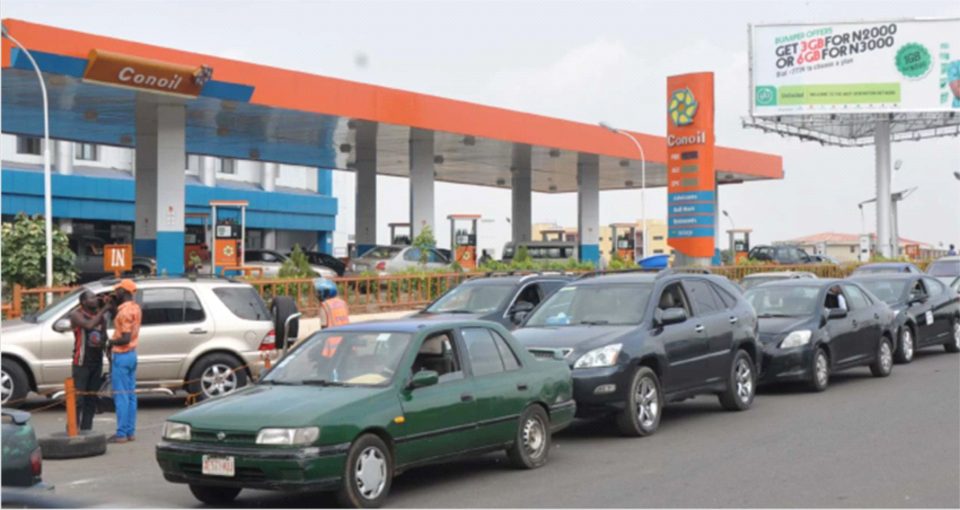The Federal Government says it was not in a hurry to adjust the pump price of fuel on account of the recent signing of the Petroleum Industry Bill (PIB) into law by President Muhammadu Buhari
Though the Act orders immediate market driven downstream sector with petroleum products selling at market price, the price of petrol would remain at N162 per litre until the government concludes its ongoing negotiation with labour unions.
Minister of state for Petroleum Resources, Timipre Sylva, gave the indication at a press conference in Abuja.
He said:“The PIB has actually deregulated the sector but that doesn’t mean that there is going to be an immediate implementation of deregulation. We are mindful of the fact that this will bring some hardship and that is why we are not just rushing to implement it. The implementation framework will take of that, how we are going to alleviate the sufferings that it will bring. We will continue to work with labour to ensure that there is a framework that will allow us to implement this provision of the PIB”.
He faulted the report that Nigerians consume 103 million litres of petrol daily, saying that average consumption was about 52 million litres/day.
He added:“The daily consumption was about 66 million litres/day when we came in and we were able to bring it down to about 52 million, that is really the average. But once in a while you have that flash and spikes that will make consumption go up because of the activities of smugglers. Those are not really the regular situation and so we cannot really use that as a measure. The average consumption is 52 million litres daily”
He insisted that the three percent host community fund in the Petroleum Transportation Industry Bill was a fair deal for the Niger Delta people.
He said that while the 13 percent derivation and the three percent Niger Delta Development Commission, NDDC, charge were generally meant for the region, the host community fund would directly provide for the communities.
He assured the people of the area that a lot of money would be available to the communities when the three percent is implemented.
He explained that it was the first time a law in Nigeria is specially targeting the development of oil bearing communities and assured the people of the area that when the three percent is implemented a lot of money would be available to the communities.
According to him:“A lot of figures have been bandied about as the desirable figure. Some say 10 percent and there are some extremists who even say 100 percent, some even say 25 percent. But what is the philosophy behind the PIB and the times which we stand?.Today, we are in the last mile of the oil economy and that is a common knowledge to everybody. It means, we are in a race to produce as much oil as we can because in the end if global trends overtake us there will still be oil in the ground but there will be no market for oil. After all coal didn’t finish in the ground before they moved away from coal.
“So, we are in that race to produce as much oil as we can now. As a country, we have a direction that we are going to. Right now, if you talk about three percent in the Bill, for us in the Niger Delta, I asked them, three percent of something is that not better than 100 percent of what you don’t know? The philosophy of this Bill is to attract investments to Nigeria to produce as much of this crude in the ground as possible. We must measure everything against this philosophy”, he stated.
He argued that the law would attract investment to the Niger Delta region and create jobs and wealth for the people, adding that the host community fund would be part of cost borne by the companies working in the region.
He explained that this will add to other costs like three percent to NDDC, one percent to Tertiary Education Trust Fund, TETFUND, and another percentage to Nigerian Content Development and Monitoring Board, NCDMB, stating that “all that go into the production costs and hikes the production cost per barrel”.
“At three percent we have been very fair to the host communities. Let them take it. This amounts to quite a lot of money as they will see. Fortunately for us, this is the only fund that is targeting the host communities in this country”, he added.
He also explained that the Frontier Exploration Fund was not meant for any particular part of the country, insisting that it was for all parts of the country.
He stated:“Frontier exploration is for areas we have prospects but we have not been able to find oil. Every frontier territory is aspiring to be a host community. The frontier territories are not in one area of the country. There are frontier territories in Cross River state, in the North East, and in the South West”.
Chief Sylva also explained that in line with the provision of the Petroleum Industry Act, the NNPC Limited will incorporated by the Ministry of Petroleum Resources and the Ministry of the Finance within six months.
He said:“The PIB has clearly stipulated a time frame within which the new NNPC will be in place. It has given a time frame of six months within which time the Ministry of Petroleum and the Ministry of Finance together will incorporate NNPC Limited. That will soon start according to the law that is in place now.
He added:“But as I said, we will wait for Mr. President because we don’t want to preempt what he will say tomorrow (Wednesday)”, he added.

